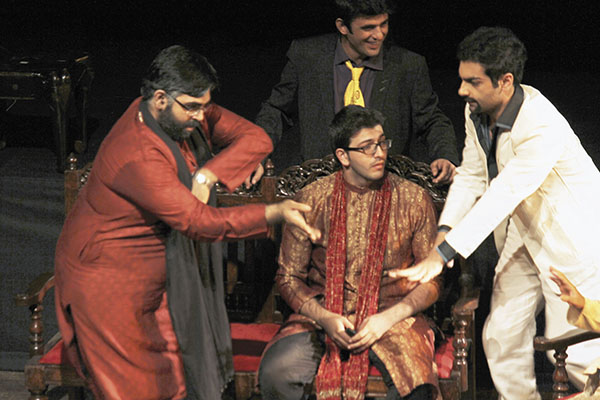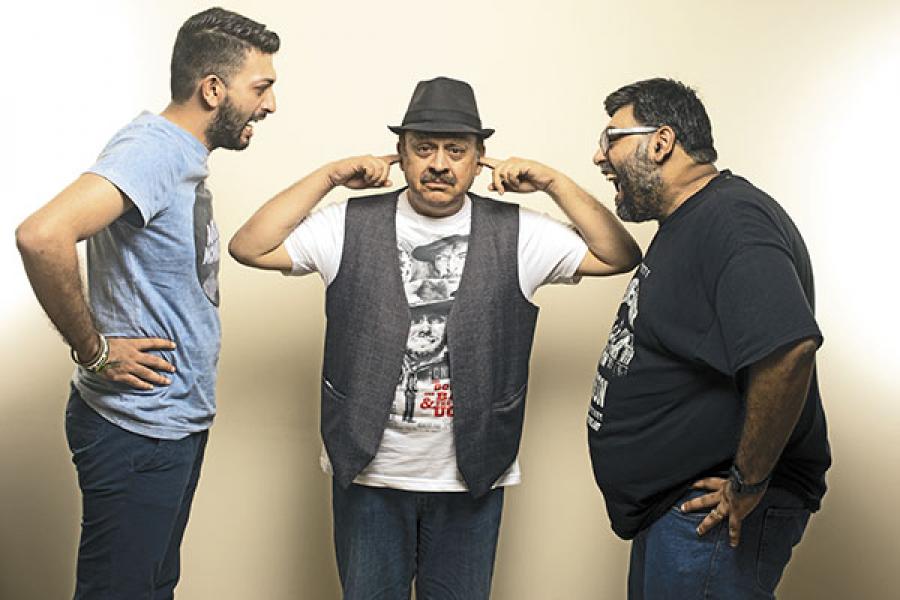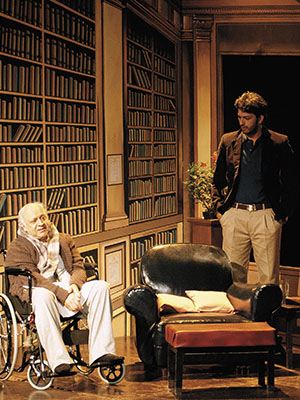
The family that acts together
With 50 productions in 15 years, the Khuranas of Akvarious Productions are setting the stage on fire
If you were an animal, which one would you be? This question is an age-old trope used by corporate companies to size up fresh-out-of-business-school youngsters during interviews. In 2010, theatre company Akvarious Productions recreated this all-too-familiar scenario in a smart production called The Interview. In the play, the protagonist nervously opts for a safe option—the tiger. “Why? Do you see yourself as extinct?” shoots back the grumpy boss. The eager-to-please youngster then feebly offers, “A panda?” As the interview moves forward, the questions get progressively bizarre and hilarious. The dark comedy goes all out in mocking the inanity of corporate work culture—brain teasers being thrown at you during interviews, confusing corporate jargon and unhealthy office politics. These situations resonate with young theatre-goers. For them, this is art imitating life.
The Interview ran for 100 shows in over 16 cities from New York to Hisar (in Haryana). Its unprecedented success helped its makers, Akvarious Productions, define their signature style: Original, contemporary and, importantly, relatable. By extension, they became instrumental in drafting younger audiences to theatre.
The men behind the company are the Khuranas, or the three AKs in Akvarious: Senior thespian Akash Khurana (64), his elder son Akarsh (36) and younger son Adhaar (28), all of whom write, direct and act. The group was started by Akarsh while performing for Thespo, a festival that gives young theatre artistes a platform to showcase their work. The Khuranas have made an invaluable contribution to Indian theatre. Last December, their unusual family business hit the 15-year and 50 productions milestones, with 22 of the productions coming in the last five years.
“They are easily among the most prolific theatre companies in Mumbai,” says theatre actor and director Quasar Padamsee, who has been witness to the evolution of Akvarious right from its inception. “Let’s take last year’s three major theatre festivals—The Aditya Birla Group’s Aadyam, the National Centre for Performing Arts’ (NCPA) Centrestage and the Prithvi Theatre Festival. They opened new productions in all of them. There’s a lot of fun in the way they work and that translates onto the stage. They’ve built an audience bit by bit.” True to form, Akvarious celebrated its 15th anniversary by pulling off a seemingly impossible feat of 27 performances over six days.
Given their frenetic pace of work, it isn’t easy getting the family together in a room. Often, they have shows running simultaneously in different cities. But when ForbesLife India does manage to catch them, the camaraderie is palpable. Through the playful ribbing and creative disagreements that ensue, there is a deep sense of comfort and friendship that shines through. “This is a family business. Because it is a strange family business, it strangely works out,” declares Adhaar.
In principle, all three are equal partners, but it is Akarsh who is the driving force behind the company. It’s his business smarts that has brought the company to a stage where it can sustain itself. Akarsh’s last full-time job was that of a scriptwriter and assistant director on the Hrithik Roshan-starrer superhero film Krrish. At that point, theatre was a part-time hobby.
“Around 2008, we were sort of in the big league and had found our way into professional theatre. When we started, getting other people to direct for us, and doing multiple productions at a time, I realised that this is something which needed more of my time,” recalls Akarsh.
But what happens when professional and personal lives collide? Says Akarsh, “I guess the trial by fire was this play called Rafta Rafta where Adhaar and I were playing father and son and I was also directing it. This was also the first time Adhaar was doing a lead role. We had a fair amount of problems during that play. It was a large cast and because of comfort levels you end up being rude with people you can get away with. I kept losing my cool with him. Thankfully, we sorted it out within the play.” Adhaar quips that it worked well for the play as “we weren’t supposed to get along”.
Besides the three AKs, the two lady Khuranas, too, form an integral part of Akvarious. Akarsh’s wife Dilshad Edibam is an actor in many of their productions. Meera, Akash’s wife, has directed four productions for the company: Enid Blyton’s The Mystery of the Pantomime Cat, Daphne du Maurier’s Rebecca, Mitch Albom’s Tuesdays with Morrie and Miss Cuckoo (an original story by Adhir Bhat). “And when I’m not directing, I pretty much play mother to everyone in the group,” says Meera. “When anyone is going through troubled times or falls sick, they come and put their head on my shoulders.” Meera herself is a child psychologist and has had a long career in education.

On stage, the five of them have shared every possible familial relationship. For instance, Akarsh played Dilshad’s father in Bade Miya Deewane. Adhaar played his father’s gay lover in Super 8, and then his student in Tuesdays with Morrie. “Working with each of them is different. It’s varying levels of torture,” grins Adhaar. “I remember rehearsing for Tuesdays with Morrie was a strange and interesting experience because it was just me, mom and dad in a room. Akarsh handled the lights on that one. But it worked out well because we treated each other like buddies.” Their father takes the lead on that.
Akash Khurana is no stranger to acting. Though he’s a mechanical engineer by qualification—he has an MBA from XLRI Jamshedpur and a PhD in social sciences as well—his love for performing arts never waned. He’s starred in several TV shows and acted in almost 50 movies. He even co-founded Nimbus Communications, a media solutions company. His love for theatre was spurred by his deep interest in literature, and that reflects in his choice of plays too. His recent productions were a comical spin on Sir Arthur Conan Doyle’s The Hound of the Baskervilles and Faith Healer, a series of monologues set in Ireland. “If you look at innovation in theatre, new spaces are being discovered and a lot of people have the same passion we saw in the generation before. But where I think the difference lies, is the play itself. The golden age of Indian theatre had a lot to do with original writing and adaptations. But people are not reading stuff that’s available. So my bigger problem is that as time passes on, the passion, skill and craft is all there, but if you don’t read you can’t write. Literature is very important,” he says.
“I agree with him. But I also disagree a little,” interjects Adhaar. “I know literature is important, but I think life itself is more important. I feel that a lot of the new-age writing is out of a slice of life. One of the plays I directed had a scene in which a bunch of guys are getting stoned. You won’t believe the number of people who came up to me and said, ‘I know those guys’ or ‘That character is my friend’.”
Interestingly, Adhaar is the Khurana who almost got away. He took off to University of Strathclyde in Glasgow to major in forensic biology, but when he graduated in 2008, recession hit and finding a job was near-impossible. “I had seen so much of the world [theatre] that I thought, ‘Let’s get out and do something different.’ More than theatre, it was Bollywood that I was running away from. At the time, Akarsh was working for Columbia TriStar and was writing his own film. I didn’t want to be a part of that world,” he says. Adds his father with a chuckle, “I think he was running away from the poverty of theatre.”
Looking back at how things turned out, his mother Meera isn’t surprised that both her kids succumbed to theatre. Akarsh, she was certain, was headed that way from the time he was born. “I started taking him to Prithvi Theatre when he was three months old. Even when I was pregnant, I used to attend my husband’s play rehearsals,” she recalls.
Akarsh starred in his first play—Naseeruddin Shah’s adaptation of Waiting for Godot—when he was just six. “I was exposed to theatre from such a young age, thanks to my father. I remember he did a Vijay Tendulkar play in 1987 that I saw for 30 shows straight. I was watching plays like Satyadev Dubey’s Sambhog Se Sanyas Tak which a little kid should not be watching,” says Akarsh.
Today, Akvarious is not just about the Khuranas. It belongs equally to a talented group of young actors and writers they have nurtured. Siddharth Kumar, who has been associated with the group as an actor for nearly a decade now, made his debut as a playwright with the award-winning The Interview in 2010. He was 26 at the time and wanted an outlet to express his takeaways from his brief corporate career. “It wasn’t really meant to be a production. I had just shared my first draft with Akarsh. When I woke up the next morning, there was a series of texts from him where he had gone from telling me that he wanted to produce this to what the cast was and the dates we will be performing,” says Kumar. Both Kumar and Akarsh have won the Mahindra Excellence in Theatre Awards (META) for the play.
The most common complaint one hears from theatre groups in Mumbai is about the lack of venues. With new companies springing up, there are only a limited number of days that each of them is allowed to perform at prominent spaces like the NCPA and Prithvi Theatre. Around 10 years ago, companies considered themselves lucky if they could manage even 12 shows a year. But one barely hears Akarsh cribbing about these issues. “One of the things his company has done is give his actors a lot of time on stage,” says Padamsee. “There’s an actor that Akvarious and my company QTP used to share and one day before a show he told me that it was his 140th performance that year. I was taken aback. That meant he was working one in three days. For a young actor to be working every other day is a great experience.”
One of Akvarious’s recent initiatives is the Fringe Festival that has been experimenting with alternative theatre venues as well as disruptive ideas that can range from the changing face of Bandra to the life of a drug peddler in Mazgaon in South Mumbai. The real victory here has been creating opportunities by performing in unlikely venues like community centres, beer pubs and local bakeries. The gatherings are intimate and interactive, but can come as a rude shock to those who still believe theatre is an art form for the elite. Senior Khurana approves of the innovation. “Back in the 1970s Dubey did a play with just three actors and no proper set. We just had great texts and competent actors,” says Akash.
It’s early days for the Fringe Festival, but it seems to be moving in the right direction. “We did one show of our play Love, Bombs and Apples at The Hive in Khar, which didn’t have too many people. But in the following week, there was a problem because it was overbooked,” laughs Kumar.
While Akvarious has made itself a name to reckon with on stage, the Khuranas aren’t just done yet. They are already weighing offers to take their work to other media, like the web and film. “Today, we have people who come and watch our plays and say we want you to write our film, or direct it,” says Adhaar. “The best part is we aren’t going to them. They are coming to us.” And that is a great place to be.
(This story appears in the May-June 2016 issue of ForbesLife India. To visit our Archives, click here.)

















